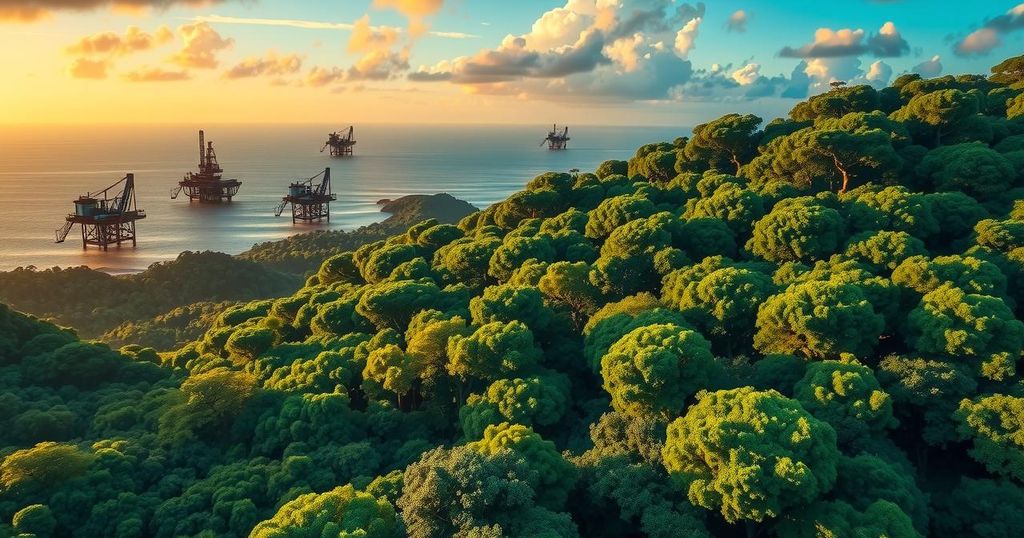World news
ABOP, AFP, ALLIANCE, AMERICAS, ASIA, BOUTERSE, CHINA, DEMOCRACY, DES, DESI BOUTERSE, ELECTION, GENERAL LIBERATION, GENERAL LIBERATION AND DEVELOPMENT PARTY, GOVERNANCE, GOVERNMENT, MEXICO, NATIONAL DEMOCRATIC PARTY, NDP, NORTH AMERICA, PARAMARIBO, PROGRESSIVE REFORM PARTY, RONNIE BRUNSWIJK, SANTOKHI, SOUTH AMERICA, SURINAME, TOTALENERGIES, VHP
Daniel O'Connor
0 Comments
Suriname Votes to Choose Government for Oil-Driven Transformation
Suriname’s parliamentary elections took place amidst the backdrop of newly discovered oil reserves. Incumbent Chan Santokhi is vying for a second term amidst economic challenges yet significant potential for transformative change. Various parties, including VHP, NDP, and ABOP, are competing for power, and results will be revealing soon. The nation’s future hinges on its approach to managing oil revenue responsibly while maintaining environmental integrity.
Voting commenced on Sunday in the Surinamese parliamentary elections, a pivotal event that could shape the future of this small South American nation. Suriname, distinguished by Dutch as its official language, contends with significant challenges such as high debt, soaring inflation, and rampant poverty, disproportionately affecting its 600,000 residents. However, recent discoveries of offshore oil may spark a transformative shift in the country’s economic landscape.
Incumbent President Chan Santokhi spoke to AFP about the potential impact of the nation’s newfound oil wealth. “It will be a huge amount of income for the country. We are now able… to do more for our people so that everyone can be part of the growth of the nation,” he stated, underscoring the significance of the oil industry in alleviating the nation’s woes.
The parliamentary elections involve 51 members, with the new parliament tasked to elect a president and vice-president within weeks. Santokhi is eligible for re-election, yet political analysts report no party holds a clear advantage ahead of the vote. Defence Minister Krishna Matheora emphasized the importance of the Progressive Reform Party (VHP) securing victory, claiming, “We have laid the foundations for economic stability and we need to build on that.”
Analysts believe that Suriname is poised to benefit financially from substantial oil reserves in the forthcoming decades. TotalEnergies, a French energy firm, revealed last year a $10.5 billion initiative to develop a promising oilfield, which could yield 220,000 barrels a day starting in 2028. In anticipation of the impending revenue, authorities have established a “Royalties for Everyone” fund designed to distribute wealth directly to Surinamese citizens.
The elections feature 14 parties, including Santokhi’s centrist VHP, former President Desi Bouterse’s leftist National Democratic Party (NDP), and the General Liberation and Development Party (ABOP), led by Vice President Ronnie Brunswijk. The latter is a former guerrilla leader who opposed Bouterse’s regime in the 1980s. Provisional election results are expected late Sunday, marking a significant moment for the nation.
As Suriname approaches the 50th anniversary of its independence from the Netherlands, its political orientation has increasingly shifted toward China, fostering both political and trade alliances. In 2019, Suriname became among the first Latin American countries to engage with China’s Belt and Road Initiative. Additionally, US Secretary of State Marco Rubio visited Suriname in March during a tour aimed at limiting China’s influence in the region.
The natural landscape of Suriname, with over 90 percent forest coverage, contributes to its unique status as one of the few nations with a negative carbon footprint. President Santokhi remains confident that the new oil revenue will not compromise this environmental standing. “It will be gone after 40 years,” he remarked, emphasizing the need for a shift toward sustainable energy amid the country’s exploitation of fossil resources.
In summary, the Surinamese elections carry substantial implications for the country’s future, particularly regarding the management of newfound oil wealth. As citizens head to the polls, the outcome will shape economic strategies and priorities for the nation over the coming years. Amid challenges, newfound resources present a significant opportunity for transformation, while the balance between environmental sustainability and development remains a critical consideration.
Original Source: www.rfi.fr




Post Comment